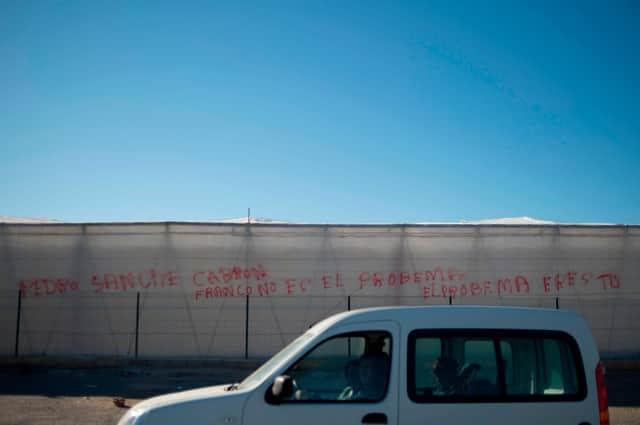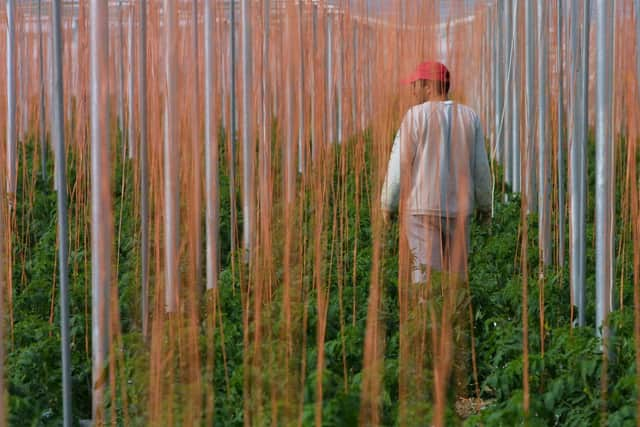Spain's most far-right town was made rich off the backs of low-paid migrant workers but some still long for General Franco's return – Alastair Stewart


The city sits among 31,000 hectares of polythene tunnels, the largest concentration of greenhouses in the world. You can observe the "sea of plastic" from the International Space Station.
El Ejido is rustic. It is an industrial city in the desert with few trappings to suggest it is wealthy. The coast of Almeria was once one of the poorest areas in southern Spain. Thanks to intensive vegetable cultivation, it has been one of the richest since the 1970s.
Advertisement
Hide AdAdvertisement
Hide AdIt's also Spain's most far-right town. Vox, the ultranationalist offshoot of the conservative People's Party (PP), made its breakthrough with 12 seats at the 2018 Andalusian regional elections. It was the first far-right group to triumph at the ballot box since the return to democracy.
The party won close to 25 per cent of the vote in El Ejido at the June 2019 local elections, and is now in coalition with the conservative PP. Andalusia returned the party's first members to the Congress of Deputies, the lower house of Spain's parliament, with 35 per cent of the vote from El Ejido.
There are an estimated 120,000 workers who toil away inside the greenhouses. Many are undocumented Moroccans and sub-Saharan workers. They are paid next to nothing. Many have no access to clean water, electricity, healthcare, basic sanitation and have no official papers (as documented by Channel 4, The Guardian, the BBC and a raft of others).
Politicians like Vox want to “Make Spain Great Again”. Migrant poverty and alleged illegality make them an easy target for cheap right-wing populism. Vox thrived because it played on unique paranoia derived from the greenhouses and the fear they hide an endless number of undocumented workers who will overwhelm the system.


Three million tonnes of fruit and veg is exported to Britain and northern Europe each year and is worth £1.2 billion. El Ejido has 25,700 registered migrant workers – nearly a third of the population – but that does not include illegal numbers. Some estimates place migrant wages at half the national minimum wage. Cheap undocumented labour is the backbone of the agricultural industry.
It is also a tale of two cities. Six miles down a dusty road is the resort town of Almerimar in the same municipality (where I lived). It sits like an island amongst the plastic sea. Tourists come here for their holidays; there's a golf course, grand hotels, and five-star dining. There's a marina, sandy beaches, horse riding, windsurfing, carnivals and festivals. It is impeccably clean and genuinely quite beautiful.
With a population of 6,000, many of them retired British citizens, Almerimar sits like a beacon among intense poverty, greenhouses and shantytowns. Street vendors known as ‘looky looky’ men, many known to the local pubs and restaurants, are accepted individually if they're regulars. Often that is as much as tourists are aware of the harsh realities nearby.
Groups of young migrant men are not seen in Almerimar despite their proximity, but it was customary to see men in rags walking up the small hill beside our gated community in the pitch dark. In the evenings, many were seen moving from bin to bin, sifting for anything of value.


Advertisement
Hide AdAdvertisement
Hide AdSpain regularly sets the record for illegal arrivals in Europe. Andalusia is a short distance away from the North African coast and is a primary arrival point for thousands travelling across the sea in makeshift rafts.
Spanish autarky might be a vote winner, but it's not practical. The same people who made El Ejido rich are discarded and feared. Graffiti such as "No Moors" is carved onto walls alongside spray-painted swastikas in El Ejido.
From store clerks to doctors and civil servants, people would refer to "The Moroccans" as dangerous. New British arrivals, especially young women, were warned not to walk the streets of El Ejido alone. A crime by one was taken as an indictment against all.
On one occasion, my internet went down for a week. The workman raved that "The Moroccans" had broken into the mast and stripped the copper from the electrical wires (it was actually the satellite on my roof that broke).
Race riots 20 years earlier still defined life there and established a status quo. Three murders by migrants lead to three days of targeted xenophobic violence. The BBC estimated there were 5,000 rioters. There are still allegations of unofficial segregation enforced by police harassment of migrants in the city. Juan José Bonilla, son of one of the men murdered in 2000, became a local politician for Vox.
Closed communities have created self-perpetuating myths, horrors, and fears. What's most damning are the children and their blasé repetition of views espoused by their parents and peers. Ethnic segregation operates along social, cultural, and religious grounds. Nothing is more staggering than the economic gulf.
And ultranationalism does not discriminate. Almerimar has a significant population of resident English speakers (reflected in signage and shop fronts) to say nothing of the thousands who visit annually. One Spanish doctor, fluent in English, refused to speak the language with a lady about a potential foetal defect. His reprimand was that she should learn Spanish (she was fluent but justifiably flustered at her emergency). Such stories were not uncommon.
Listening to Spaniards over the age of 55 is a fascinating tour of Francoism, the transition to democracy, the European Union and the genuine fear of unstoppable migration.
Advertisement
Hide AdAdvertisement
Hide AdThere's a palpable longing in some quarters, including among the young, for the simpler, organised, cohesive days of Francoist Spain. This conveniently ignores the 614 mass grave sites for Franco's victims in Andalusia alone.
What made El Ejido and Almerimar remarkable places to spend any time is the living, tangible hypocrisy of all racism: people, all people, make a place. Perhaps Vox should borrow from Edmund Burke: “To make us love El Ejido, El Ejido ought to be lovely.”
A message from the Editor:
Thank you for reading this article. We're more reliant on your support than ever as the shift in consumer habits brought about by coronavirus impacts our advertisers.
If you haven't already, please consider supporting our trusted, fact-checked journalism by taking out a digital subscription.
Comments
Want to join the conversation? Please or to comment on this article.
